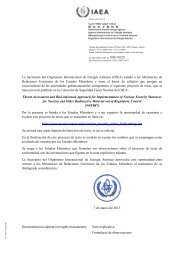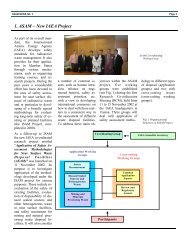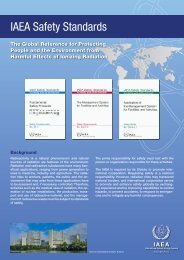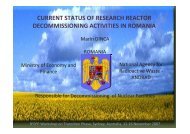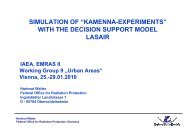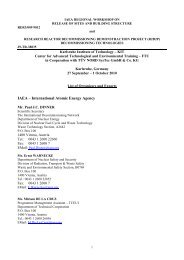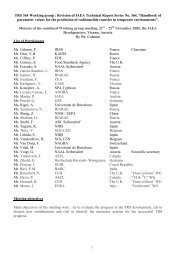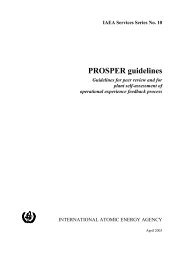- Page 5 and 6:
1. Nuclear Reactor Principles · 1
- Page 7:
1. Nuclear Reactor Principles Regio
- Page 10 and 11:
Table 1.2. Average cross sections f
- Page 13 and 14:
1. Nuclear Reactor Principles ❙ 7
- Page 15 and 16:
energy of the fuel nuclei. ❙ 9
- Page 17 and 18:
❙ 11 ❙ 1. Nuclear Reactor Princ
- Page 19 and 20:
❙ 13 ❙ 1. Nuclear Reactor Princ
- Page 21 and 22:
❙ 15 ❙ 1. Nuclear Reactor Princ
- Page 23 and 24:
1 Bq = 2.7x10 -5 µCi = 2.7x10 -8 m
- Page 25 and 26:
1.1.5. Natural radioactive series
- Page 27 and 28:
238 U 92+ 1 n0 -----> 135 Te 52 + 9
- Page 29 and 30:
❙ 23 ❙ 1. Nuclear Reactor Princ
- Page 31 and 32:
σ t = σ s + σ a = σ elastic +
- Page 33 and 34:
FIG. 1.10. And here in the 1keV to
- Page 35 and 36:
❙ 29 ❙ 1. Nuclear Reactor Princ
- Page 37 and 38:
❙ 31 ❙ 1. Nuclear Reactor Princ
- Page 39 and 40:
1.2.3.2. Neutron emission in fissio
- Page 41 and 42:
❙ 35 ❙ 1. Nuclear Reactor Princ
- Page 43 and 44:
Three possible states could then be
- Page 45 and 46:
TABLE 1.3. Slowing down efficiency
- Page 47 and 48:
1 UNGG/AGR CANDU PWR/BWR TABLE 1.5.
- Page 49 and 50:
❙ 43 ❙ 1. Nuclear Reactor Princ
- Page 51 and 52:
❙ 45 ❙ 1. Nuclear Reactor Princ
- Page 53 and 54:
❙ 47 ❙ 1. Nuclear Reactor Princ
- Page 55 and 56:
❙ 49 ❙ 1. Nuclear Reactor Princ
- Page 57 and 58:
❙ 51 ❙ 1. Nuclear Reactor Princ
- Page 59:
✼✼✼ REFERENCES ✼✼✼ ❙
- Page 63 and 64:
2.1. Introduction C O N T E N T S 2
- Page 65 and 66:
2. Radiation Protection 2.1. Introd
- Page 67 and 68:
2.2.1. Exposure ❙ 61 ❙ 2. Radia
- Page 69 and 70:
❙ 63 ❙ 2. Radiation Protection
- Page 71 and 72:
❙ 65 ❙ 2. Radiation Protection
- Page 73 and 74:
2.2.4. Effective dose ❙ 67 ❙ 2.
- Page 75 and 76:
❙ 69 ❙ 2. Radiation Protection
- Page 77 and 78:
❙ 71 ❙ 2. Radiation Protection
- Page 79 and 80:
❙ 73 ❙ 2. Radiation Protection
- Page 81 and 82:
❙ 75 ❙ 2. Radiation Protection
- Page 83 and 84:
schematically in Fig. (2.7). ❙ 77
- Page 85 and 86:
❙ 79 ❙ 2. Radiation Protection
- Page 87 and 88:
The great utility of the G‐M tube
- Page 89 and 90:
❙ 83 ❙ 2. Radiation Protection
- Page 91 and 92:
❙ 85 ❙ 2. Radiation Protection
- Page 93 and 94:
❙ 87 ❙ 2. Radiation Protection
- Page 95 and 96:
❙ 89 ❙ 2. Radiation Protection
- Page 97 and 98:
❙ 91 ❙ 2. Radiation Protection
- Page 99 and 100:
protection conditions. These factor
- Page 101 and 102:
2.6.2. Effects of dose, dose‐rate
- Page 103 and 104:
❙ 97 ❙ 2. Radiation Protection
- Page 105 and 106:
2.7. Principles of Radiological Pro
- Page 107 and 108:
❙ 101 ❙ 2. Radiation Protection
- Page 109 and 110:
❙ 103 ❙ 2. Radiation Protection
- Page 111 and 112:
❙ 105 ❙ 2. Radiation Protection
- Page 113 and 114:
❙ 107 ❙ 2. Radiation Protection
- Page 115 and 116:
❙ 109 ❙ 2. Radiation Protection
- Page 117 and 118:
❙ 111 ❙ 2. Radiation Protection
- Page 119 and 120:
❙ 113 ❙ 2. Radiation Protection
- Page 121 and 122:
❙ 115 ❙ N 0 = N 2 1 t / t 1/ 2
- Page 123 and 124:
ln 10 = μ t1/10 ≈ 3 · ln 2 = 3
- Page 125:
✼✼✼ REFERENCES ✼✼✼ ❙
- Page 129 and 130:
C O N T E N T S | Table of Contents
- Page 131:
Fig. 1 Committees for IAEA Safety S
- Page 134 and 135:
Regional Basic Professional Trainin
- Page 136 and 137:
Regional Basic Professional Trainin
- Page 138 and 139:
Regional Basic Professional Trainin
- Page 140 and 141:
Regional Basic Professional Trainin
- Page 142 and 143:
Regional Basic Professional Trainin
- Page 144 and 145:
Regional Basic Professional Trainin
- Page 146 and 147:
Regional Basic Professional Trainin
- Page 148 and 149:
Regional Basic Professional Trainin
- Page 150 and 151:
Regional Basic Professional Trainin
- Page 152 and 153:
Regional Basic Professional Trainin
- Page 154 and 155:
Regional Basic Professional Trainin
- Page 156 and 157:
Regional Basic Professional Trainin
- Page 158 and 159:
Regional Basic Professional Trainin
- Page 160 and 161:
Regional Basic Professional Trainin
- Page 162 and 163:
Regional Basic Professional Trainin
- Page 164 and 165:
Regional Basic Professional Trainin
- Page 166 and 167:
Regional Basic Professional Trainin
- Page 168 and 169:
Regional Basic Professional Trainin
- Page 170 and 171:
Regional Basic Professional Trainin
- Page 172 and 173:
Regional Basic Professional Trainin
- Page 174 and 175:
Regional Basic Professional Trainin
- Page 176 and 177:
Regional Basic Professional Trainin
- Page 178 and 179:
Regional Basic Professional Trainin
- Page 180 and 181:
Regional Basic Professional Trainin
- Page 182 and 183:
Regional Basic Professional Trainin
- Page 184 and 185:
Regional Basic Professional Trainin
- Page 186 and 187:
Regional Basic Professional Trainin
- Page 188 and 189:
Regional Basic Professional Trainin
- Page 190 and 191:
Regional Basic Professional Trainin
- Page 192 and 193:
Regional Basic Professional Trainin
- Page 194 and 195:
Regional Basic Professional Trainin
- Page 196 and 197:
Regional Basic Professional Trainin
- Page 198 and 199:
Regional Basic Professional Trainin
- Page 200 and 201:
Regional Basic Professional Trainin
- Page 202 and 203:
Regional Basic Professional Trainin
- Page 204 and 205:
Regional Basic Professional Trainin
- Page 206 and 207:
Regional Basic Professional Trainin
- Page 208 and 209:
Regional Basic Professional Trainin
- Page 210 and 211:
Regional Basic Professional Trainin
- Page 212 and 213:
Regional Basic Professional Trainin
- Page 214 and 215:
Regional Basic Professional Trainin
- Page 216 and 217:
Regional Basic Professional Trainin
- Page 218 and 219:
Regional Basic Professional Trainin
- Page 220 and 221:
Regional Basic Professional Trainin
- Page 222 and 223:
Regional Basic Professional Trainin
- Page 225 and 226:
C O N T E N T S | Table of Contents
- Page 227 and 228:
❙ 221 ❙ 4. DESIGN OF NUCLEAR RE
- Page 229 and 230:
4.1.1.2. The concept of defence in
- Page 231 and 232:
4.1.2. Requirements for management
- Page 233 and 234:
❙ 227 ❙ 4. DESIGN OF NUCLEAR RE
- Page 235 and 236:
❙ 229 ❙ 4. DESIGN OF NUCLEAR RE
- Page 237 and 238:
administrative control. ❙ 231 ❙
- Page 239 and 240:
❙ 233 ❙ 4. DESIGN OF NUCLEAR RE
- Page 241 and 242:
❙ 235 ❙ 4. DESIGN OF NUCLEAR RE
- Page 243 and 244:
Design basis accidents ❙ 237 ❙
- Page 245 and 246:
Single failure criterion ❙ 239
- Page 247 and 248:
❙ 241 ❙ 4. DESIGN OF NUCLEAR RE
- Page 249 and 250:
❙ 243 ❙ 4. DESIGN OF NUCLEAR RE
- Page 251 and 252:
Deterministic approach The determin
- Page 253 and 254:
accidents, with account taken of th
- Page 255 and 256:
Fuel elements and assemblies Fig. 4
- Page 257 and 258:
Reactor shutdown ❙ 251 ❙ 4. DES
- Page 259 and 260:
❙ 253 ❙ 4. DESIGN OF NUCLEAR RE
- Page 261 and 262:
❙ 255 ❙ 4. DESIGN OF NUCLEAR RE
- Page 263 and 264:
❙ 257 ❙ 4. DESIGN OF NUCLEAR RE
- Page 265 and 266:
functional in the event of a severe
- Page 267 and 268:
4.1.5.4. Instrumentation and contro
- Page 269 and 270:
❙ 263 ❙ 4. DESIGN OF NUCLEAR RE
- Page 271 and 272:
❙ 265 ❙ 4. DESIGN OF NUCLEAR RE
- Page 273 and 274:
❙ 267 ❙ 4. DESIGN OF NUCLEAR RE
- Page 275 and 276:
4.1.5.9. Radiation protection Gener
- Page 277 and 278:
❙ 271 ❙ 4. DESIGN OF NUCLEAR RE
- Page 279 and 280:
❙ 273 ❙ 4. DESIGN OF NUCLEAR RE
- Page 281 and 282:
❙ 275 ❙ 4. DESIGN OF NUCLEAR RE
- Page 283 and 284:
Operation at a power level < 1 MW.
- Page 285 and 286:
❙ 279 ❙ 4. DESIGN OF NUCLEAR RE
- Page 287 and 288:
of these exchangers, the water is c
- Page 289 and 290:
❙ 283 ❙ 4. DESIGN OF NUCLEAR RE
- Page 291 and 292:
❙ 285 ❙ 4. DESIGN OF NUCLEAR RE
- Page 293 and 294:
❙ 287 ❙ 4. DESIGN OF NUCLEAR RE
- Page 295 and 296:
❙ 289 ❙ 4. DESIGN OF NUCLEAR RE
- Page 297 and 298:
❙ 291 ❙ 4. DESIGN OF NUCLEAR RE
- Page 299 and 300:
Fig. 4.11. HANARO Core Pool Fig. 4.
- Page 301 and 302:
4.2.6.2.3 Reactor Systems ❙ 295
- Page 303 and 304:
❙ 297 ❙ 4. DESIGN OF NUCLEAR RE
- Page 305 and 306:
4.2.6.5. Neutron Activity Analysis
- Page 307 and 308:
❙ 301 ❙ 4. DESIGN OF NUCLEAR RE
- Page 309 and 310:
❏ physical separation. ❙ 303
- Page 311:
5. Siting Considerations Regional B
- Page 314 and 315:
5.4.2. Sources of risk 5.4.3. Evalu
- Page 316 and 317:
Regional Basic Professional Trainin
- Page 318 and 319:
Regional Basic Professional Trainin
- Page 320 and 321:
Regional Basic Professional Trainin
- Page 322 and 323:
Regional Basic Professional Trainin
- Page 324 and 325:
Regional Basic Professional Trainin
- Page 326 and 327:
Regional Basic Professional Trainin
- Page 328 and 329:
Regional Basic Professional Trainin
- Page 330 and 331:
Regional Basic Professional Trainin
- Page 332 and 333:
Regional Basic Professional Trainin
- Page 334 and 335:
Regional Basic Professional Trainin
- Page 336 and 337:
Regional Basic Professional Trainin
- Page 338 and 339:
Regional Basic Professional Trainin
- Page 340 and 341:
Regional Basic Professional Trainin
- Page 342 and 343:
Regional Basic Professional Trainin
- Page 344 and 345:
Regional Basic Professional Trainin
- Page 346 and 347:
Regional Basic Professional Trainin
- Page 348 and 349:
Regional Basic Professional Trainin
- Page 350 and 351:
Regional Basic Professional Trainin
- Page 352 and 353:
Regional Basic Professional Trainin
- Page 354 and 355:
Regional Basic Professional Trainin
- Page 356 and 357:
Regional Basic Professional Trainin
- Page 358 and 359:
Regional Basic Professional Trainin
- Page 360 and 361:
Regional Basic Professional Trainin
- Page 362 and 363:
Regional Basic Professional Trainin
- Page 365 and 366:
C O N T E N T S | Table of Contents
- Page 367 and 368:
6. Safety Classification Of Structu
- Page 369 and 370:
6. Safety Classification Of Structu
- Page 371 and 372:
Safety functions necessary to preve
- Page 373 and 374:
6. Safety Classification Of Structu
- Page 375 and 376:
6.1.3. Principal Safety Classes 6.
- Page 377 and 378:
6. Safety Classification Of Structu
- Page 379 and 380:
6. Safety Classification Of Structu
- Page 381 and 382:
6. Safety Classification Of Structu
- Page 383 and 384:
function; 6. Safety Classification
- Page 385 and 386:
6. Safety Classification Of Structu
- Page 387 and 388:
6. Safety Classification Of Structu
- Page 389 and 390:
the safety function would be requir
- Page 391 and 392:
6. Safety Classification Of Structu
- Page 393 and 394:
6. Safety Classification Of Structu
- Page 395 and 396:
6.3.2. Description of Quality Group
- Page 397 and 398:
6. Safety Classification Of Structu
- Page 399 and 400:
6. Safety Classification Of Structu
- Page 401 and 402:
6. Safety Classification Of Structu
- Page 403 and 404:
6. Safety Classification Of Structu
- Page 405 and 406:
6.4.3. Seismic category 1: 6.4.3.1.
- Page 407 and 408:
6. Safety Classification Of Structu
- Page 409 and 410:
6. Safety Classification Of Structu
- Page 411 and 412:
6. Safety Classification Of Structu
- Page 413:
7. Quality Assurance Regional Basic
- Page 416 and 417:
7.5.1. Manufacture Quality Assuranc
- Page 418 and 419:
Regional Basic Professional Trainin
- Page 420 and 421:
Regional Basic Professional Trainin
- Page 422 and 423:
Regional Basic Professional Trainin
- Page 424 and 425:
Regional Basic Professional Trainin
- Page 426 and 427:
Regional Basic Professional Trainin
- Page 428 and 429:
Regional Basic Professional Trainin
- Page 430 and 431:
Regional Basic Professional Trainin
- Page 432 and 433:
Regional Basic Professional Trainin
- Page 434 and 435:
Regional Basic Professional Trainin
- Page 436 and 437:
Regional Basic Professional Trainin
- Page 438 and 439:
Regional Basic Professional Trainin
- Page 440 and 441:
Regional Basic Professional Trainin
- Page 442 and 443:
Regional Basic Professional Trainin
- Page 444 and 445:
Regional Basic Professional Trainin
- Page 446 and 447:
Regional Basic Professional Trainin
- Page 448 and 449:
Regional Basic Professional Trainin
- Page 450 and 451:
Regional Basic Professional Trainin
- Page 452 and 453:
Regional Basic Professional Trainin
- Page 454 and 455:
Regional Basic Professional Trainin
- Page 456 and 457:
Regional Basic Professional Trainin
- Page 458 and 459:
Regional Basic Professional Trainin
- Page 460 and 461:
Regional Basic Professional Trainin
- Page 462 and 463:
Regional Basic Professional Trainin
- Page 464 and 465: Regional Basic Professional Trainin
- Page 466 and 467: Regional Basic Professional Trainin
- Page 468 and 469: Regional Basic Professional Trainin
- Page 470 and 471: Regional Basic Professional Trainin
- Page 472 and 473: Regional Basic Professional Trainin
- Page 475 and 476: C O N T E N T S 8.1. INTRODUCTION |
- Page 477 and 478: ❙ 471 ❙ 8-A. Deterministic Acci
- Page 479 and 480: ❙ 473 ❙ 8-A. Deterministic Acci
- Page 481 and 482: ❙ 475 ❙ 8-A. Deterministic Acci
- Page 483 and 484: guidelines for this categorization.
- Page 485 and 486: ❙ 479 ❙ 8-A. Deterministic Acci
- Page 487 and 488: ❙ 481 ❙ 8-A. Deterministic Acci
- Page 489 and 490: Table 8‐3 Typical Initial Conditi
- Page 491 and 492: ❙ 485 ❙ 8-A. Deterministic Acci
- Page 493 and 494: ❙ 487 ❙ 8-A. Deterministic Acci
- Page 495 and 496: ❙ 489 ❙ 8-A. Deterministic Acci
- Page 497 and 498: 8.5.3. Decrease in Reactor Coolant
- Page 499 and 500: ❙ 493 ❙ 8-A. Deterministic Acci
- Page 501 and 502: or by operator error, often during
- Page 503 and 504: ❙ 497 ❙ 8-A. Deterministic Acci
- Page 505 and 506: ❙ 499 ❙ 8-A. Deterministic Acci
- Page 507 and 508: ❙ 501 ❙ 8-A. Deterministic Acci
- Page 509: 8-B. Deterministic Accident Analysi
- Page 512 and 513: | List of Tables | Table 8.7‐1 Ru
- Page 516 and 517: Regional Basic Professional Trainin
- Page 518 and 519: Regional Basic Professional Trainin
- Page 520 and 521: Regional Basic Professional Trainin
- Page 522 and 523: Regional Basic Professional Trainin
- Page 524 and 525: Regional Basic Professional Trainin
- Page 526 and 527: Regional Basic Professional Trainin
- Page 528 and 529: Regional Basic Professional Trainin
- Page 530 and 531: Regional Basic Professional Trainin
- Page 532 and 533: Regional Basic Professional Trainin
- Page 534 and 535: Regional Basic Professional Trainin
- Page 536 and 537: Regional Basic Professional Trainin
- Page 538 and 539: Regional Basic Professional Trainin
- Page 540 and 541: Regional Basic Professional Trainin
- Page 542 and 543: Regional Basic Professional Trainin
- Page 544 and 545: Regional Basic Professional Trainin
- Page 546 and 547: Regional Basic Professional Trainin
- Page 548 and 549: Regional Basic Professional Trainin
- Page 550 and 551: Regional Basic Professional Trainin
- Page 552 and 553: Regional Basic Professional Trainin
- Page 554 and 555: Regional Basic Professional Trainin
- Page 556 and 557: Regional Basic Professional Trainin
- Page 558 and 559: Regional Basic Professional Trainin
- Page 560 and 561: Regional Basic Professional Trainin
- Page 563 and 564: C O N T E N T S 9.1. BASIC CONCEPT
- Page 565 and 566:
9.1.1. Background 9. Probabilistic
- Page 567 and 568:
❙ 561 ❙ 9. Probabilistic Safety
- Page 569 and 570:
that are important for safety and d
- Page 571 and 572:
Some typical uses of level 2 PSA ar
- Page 573 and 574:
Release of fission products during
- Page 575 and 576:
❙ 569 ❙ 9. Probabilistic Safety
- Page 577 and 578:
❙ 571 ❙ 9. Probabilistic Safety
- Page 579 and 580:
❙ 573 ❙ 9. Probabilistic Safety
- Page 581 and 582:
❙ 575 ❙ 9. Probabilistic Safety
- Page 583 and 584:
e indicated according to their spec
- Page 585 and 586:
❙ 579 ❙ 9. Probabilistic Safety
- Page 587 and 588:
❙ 581 ❙ 9. Probabilistic Safety
- Page 589 and 590:
several pumps due to an inappropria
- Page 591 and 592:
❙ 585 ❙ 9. Probabilistic Safety
- Page 593 and 594:
❙ 587 ❙ 9. Probabilistic Safety
- Page 595 and 596:
Parts common to a number of systems
- Page 597 and 598:
❙ 591 ❙ 9. Probabilistic Safety
- Page 599 and 600:
9.4.3. Level 1 - level 2 interface
- Page 601 and 602:
In-vessel processes during the late
- Page 603 and 604:
❙ 597 ❙ 9. Probabilistic Safety
- Page 605 and 606:
y data, analyses and consideration
- Page 607 and 608:
❙ 601 ❙ 9. Probabilistic Safety
- Page 609 and 610:
❙ 603 ❙ 9. Probabilistic Safety
- Page 611 and 612:
examples of useful insights of PSAs
- Page 613 and 614:
❙ 607 ❙ 9. Probabilistic Safety
- Page 615 and 616:
Assessment -vs- demonstration. PSA
- Page 617 and 618:
❙ 611 ❙ 9. Probabilistic Safety
- Page 619 and 620:
❙ 613 ❙ 9. Probabilistic Safety
- Page 621 and 622:
❙ 615 ❙ 9. Probabilistic Safety
- Page 623 and 624:
❙ 617 ❙ 9. Probabilistic Safety
- Page 625 and 626:
❙ 619 ❙ 9. Probabilistic Safety
- Page 627 and 628:
✼✼✼ REFERENCES ✼✼✼ ❙
- Page 629:
10-A. Limiting Conditions for Opera
- Page 632 and 633:
Table 10.2 Operational Modes of Ulj
- Page 634 and 635:
Regional Basic Professional Trainin
- Page 636 and 637:
Regional Basic Professional Trainin
- Page 638 and 639:
Regional Basic Professional Trainin
- Page 640 and 641:
Regional Basic Professional Trainin
- Page 642 and 643:
Regional Basic Professional Trainin
- Page 644 and 645:
Regional Basic Professional Trainin
- Page 646 and 647:
Regional Basic Professional Trainin
- Page 648 and 649:
Regional Basic Professional Trainin
- Page 650 and 651:
Regional Basic Professional Trainin
- Page 652 and 653:
Regional Basic Professional Trainin
- Page 654 and 655:
Regional Basic Professional Trainin
- Page 656 and 657:
Regional Basic Professional Trainin
- Page 658 and 659:
Regional Basic Professional Trainin
- Page 660 and 661:
Regional Basic Professional Trainin
- Page 662 and 663:
Regional Basic Professional Trainin
- Page 664 and 665:
Regional Basic Professional Trainin
- Page 666 and 667:
Regional Basic Professional Trainin
- Page 668 and 669:
Regional Basic Professional Trainin
- Page 670 and 671:
Regional Basic Professional Trainin
- Page 672 and 673:
Regional Basic Professional Trainin
- Page 675:
C O N T E N T S | Table of Contents
- Page 678 and 679:
Regional Basic Professional Trainin
- Page 680 and 681:
Regional Basic Professional Trainin
- Page 682 and 683:
Regional Basic Professional Trainin
- Page 684 and 685:
Regional Basic Professional Trainin
- Page 686 and 687:
Regional Basic Professional Trainin
- Page 688 and 689:
Regional Basic Professional Trainin
- Page 690 and 691:
Regional Basic Professional Trainin
- Page 692 and 693:
Regional Basic Professional Trainin
- Page 694 and 695:
Regional Basic Professional Trainin
- Page 696 and 697:
Regional Basic Professional Trainin
- Page 698 and 699:
Regional Basic Professional Trainin
- Page 700 and 701:
Regional Basic Professional Trainin
- Page 702 and 703:
Regional Basic Professional Trainin
- Page 705 and 706:
C O N T E N T S 11.1. THE HUMAN FAC
- Page 707 and 708:
11. Human Performance: A Perspectiv
- Page 709 and 710:
11. Human Performance: A Perspectiv
- Page 711 and 712:
11. Human Performance: A Perspectiv
- Page 713 and 714:
Methods Questions/Evaluations propo
- Page 715 and 716:
documented by pencil goes through.
- Page 717 and 718:
11. Human Performance: A Perspectiv
- Page 719 and 720:
11. Human Performance: A Perspectiv
- Page 721 and 722:
B. Model of Mistake 11. Human Perfo
- Page 723 and 724:
C. Model of Slips 11. Human Perform
- Page 725 and 726:
11. Human Performance: A Perspectiv
- Page 727 and 728:
11. Human Performance: A Perspectiv
- Page 729 and 730:
11. Human Performance: A Perspectiv
- Page 731 and 732:
11. Human Performance: A Perspectiv
- Page 733 and 734:
11. Human Performance: A Perspectiv
- Page 735 and 736:
They can belong to one of these fam
- Page 737 and 738:
11. Human Performance: A Perspectiv
- Page 739 and 740:
11. Human Performance: A Perspectiv
- Page 741 and 742:
11. Human Performance: A Perspectiv
- Page 743 and 744:
11. Human Performance: A Perspectiv
- Page 745 and 746:
11. Human Performance: A Perspectiv
- Page 747:
11. Human Performance: A Perspectiv
- Page 751 and 752:
C O N T E N T S | Table of Contents
- Page 753 and 754:
12. Surveillance Programmes 12.1. C
- Page 755 and 756:
❙ 749 ❙ 12. Surveillance Progra
- Page 757 and 758:
❙ 751 ❙ 12. Surveillance Progra
- Page 759 and 760:
12.2.2. Surveillance of integrity o
- Page 761 and 762:
Containment spray systems; Chemical
- Page 763 and 764:
High energy piping and associated p
- Page 765 and 766:
❙ 759 ❙ 12. Surveillance Progra
- Page 767 and 768:
❙ 761 ❙ 12. Surveillance Progra
- Page 769 and 770:
❙ 763 ❙ 12. Surveillance Progra
- Page 771 and 772:
❙ 765 ❙ 12. Surveillance Progra
- Page 773 and 774:
❙ 767 ❙ 12. Surveillance Progra
- Page 775 and 776:
failure of which might put in jeopa
- Page 777 and 778:
❙ 771 ❙ 12. Surveillance Progra
- Page 779 and 780:
12.3.6. Equipment ❙ 773 ❙ 12. S
- Page 781 and 782:
The grading criteria for detection
- Page 783 and 784:
❙ 777 ❙ 12. Surveillance Progra
- Page 785 and 786:
12.4.1. General 12.4. IMPLEMENTATIO
- Page 787 and 788:
monitors are part of the safety sys
- Page 789 and 790:
❙ 783 ❙ 12. Surveillance Progra
- Page 791 and 792:
❙ 785 ❙ 12. Surveillance Progra
- Page 793 and 794:
❙ 787 ❙ 12. Surveillance Progra
- Page 795 and 796:
inspection. ❙ 789 ❙ 12. Surveil
- Page 797 and 798:
12.5.4. Example of Regulatory Inspe
- Page 799:
maximum flow in addition to rated f
- Page 803:
C O N T E N T S 1. The Overview of
- Page 806 and 807:
Regional Basic Professional Trainin
- Page 808 and 809:
Regional Basic Professional Trainin
- Page 810 and 811:
Regional Basic Professional Trainin
- Page 812 and 813:
Regional Basic Professional Trainin
- Page 814 and 815:
Regional Basic Professional Trainin
- Page 816 and 817:
Regional Basic Professional Trainin
- Page 818 and 819:
Regional Basic Professional Trainin
- Page 820 and 821:
Regional Basic Professional Trainin
- Page 822 and 823:
Regional Basic Professional Trainin
- Page 824 and 825:
Regional Basic Professional Trainin
- Page 826 and 827:
Regional Basic Professional Trainin
- Page 828 and 829:
Regional Basic Professional Trainin
- Page 831:
15. Operational Safety Regional Bas
- Page 834 and 835:
15.3. OPERATING ORGANIZATION AT KOR
- Page 836 and 837:
Regional Basic Professional Trainin
- Page 838 and 839:
Regional Basic Professional Trainin
- Page 840 and 841:
Regional Basic Professional Trainin
- Page 842 and 843:
Regional Basic Professional Trainin
- Page 844 and 845:
Regional Basic Professional Trainin
- Page 846 and 847:
Regional Basic Professional Trainin
- Page 848 and 849:
Regional Basic Professional Trainin
- Page 850 and 851:
Regional Basic Professional Trainin
- Page 852 and 853:
Regional Basic Professional Trainin
- Page 854 and 855:
Regional Basic Professional Trainin
- Page 856 and 857:
Regional Basic Professional Trainin
- Page 858 and 859:
Regional Basic Professional Trainin
- Page 860 and 861:
Regional Basic Professional Trainin
- Page 862 and 863:
Regional Basic Professional Trainin
- Page 864 and 865:
Regional Basic Professional Trainin
- Page 866 and 867:
Regional Basic Professional Trainin
- Page 868 and 869:
Regional Basic Professional Trainin
- Page 870 and 871:
Regional Basic Professional Trainin
- Page 872 and 873:
Regional Basic Professional Trainin
- Page 874 and 875:
Regional Basic Professional Trainin
- Page 876 and 877:
Regional Basic Professional Trainin
- Page 878 and 879:
Regional Basic Professional Trainin
- Page 880 and 881:
Regional Basic Professional Trainin
- Page 882 and 883:
Regional Basic Professional Trainin
- Page 884 and 885:
Regional Basic Professional Trainin
- Page 886 and 887:
Regional Basic Professional Trainin
- Page 888 and 889:
Regional Basic Professional Trainin
- Page 890 and 891:
Regional Basic Professional Trainin
- Page 892 and 893:
Regional Basic Professional Trainin
- Page 895:
16. In‐Plant Accident Management
- Page 898 and 899:
16.5.3. Reference source terms Tabl
- Page 900 and 901:
Regional Basic Professional Trainin
- Page 902 and 903:
Regional Basic Professional Trainin
- Page 904 and 905:
Regional Basic Professional Trainin
- Page 906 and 907:
Regional Basic Professional Trainin
- Page 908 and 909:
Regional Basic Professional Trainin
- Page 910 and 911:
Regional Basic Professional Trainin
- Page 912 and 913:
Regional Basic Professional Trainin
- Page 914 and 915:
Regional Basic Professional Trainin
- Page 916 and 917:
Regional Basic Professional Trainin
- Page 918 and 919:
Regional Basic Professional Trainin
- Page 920 and 921:
Regional Basic Professional Trainin
- Page 922 and 923:
Regional Basic Professional Trainin
- Page 924 and 925:
Regional Basic Professional Trainin
- Page 926 and 927:
Regional Basic Professional Trainin
- Page 928 and 929:
Regional Basic Professional Trainin
- Page 930 and 931:
Regional Basic Professional Trainin
- Page 932 and 933:
Regional Basic Professional Trainin
- Page 934 and 935:
Regional Basic Professional Trainin
- Page 936 and 937:
Regional Basic Professional Trainin
- Page 938 and 939:
Regional Basic Professional Trainin
- Page 940 and 941:
Regional Basic Professional Trainin
- Page 942 and 943:
Regional Basic Professional Trainin
- Page 944 and 945:
Regional Basic Professional Trainin
- Page 946 and 947:
Regional Basic Professional Trainin
- Page 948 and 949:
Regional Basic Professional Trainin
- Page 950 and 951:
Regional Basic Professional Trainin
- Page 952 and 953:
Regional Basic Professional Trainin
- Page 955:
17. Radiological Emergency Planning
- Page 959 and 960:
❙ 953 ❙ 17. Radiological Emerge
- Page 961 and 962:
2. Emergency Classification and Res
- Page 963 and 964:
❙ 957 ❙ 17. Radiological Emerge
- Page 965 and 966:
❙ 959 ❙ 17. Radiological Emerge
- Page 967 and 968:
❙ 961 ❙ 17. Radiological Emerge
- Page 969 and 970:
❙ 963 ❙ 17. Radiological Emerge
- Page 971:
❙ 965 ❙ 17. Radiological Emerge
- Page 975 and 976:
C O N T E N T S | Table of Contents
- Page 977 and 978:
19. Decommissioning 19.1. IAEA SAFE
- Page 979 and 980:
❙ 973 ❙ 19. Decommissioning res
- Page 981 and 982:
❙ 975 ❙ 19. Decommissioning Req
- Page 983 and 984:
❙ 977 ❙ 19. Decommissioning is
- Page 985 and 986:
❙ 979 ❙ 19. Decommissioning gai
- Page 987 and 988:
❙ 981 ❙ 19. Decommissioning Ade
- Page 989 and 990:
❙ 983 ❙ 19. Decommissioning rel
- Page 991 and 992:
❙ 985 ❙ 19. Decommissioning dec
- Page 993 and 994:
❙ 987 ❙ 19. Decommissioning reg
- Page 995 and 996:
❙ 989 ❙ 19. Decommissioning bei
- Page 997 and 998:
❙ 991 ❙ 19. Decommissioning kno
- Page 999 and 1000:
❙ 993 ❙ 19. Decommissioning per
- Page 1001 and 1002:
❙ 995 ❙ 19. Decommissioning par
- Page 1003 and 1004:
❙ 997 ❙ 19. Decommissioning cut
- Page 1005 and 1006:
from regulatory control. ❙ 999
- Page 1007 and 1008:
❙ 1001 ❙ 19. Decommissioning as
- Page 1009 and 1010:
material (of the order of 300 μSv
- Page 1011 and 1012:
methods of decommissioning the nucl
- Page 1013 and 1014:
✼✼✼ REFERENCES ✼✼✼ ❙
- Page 1015 and 1016:
❙ 1009 ❙ 19. Decommissioning 19
- Page 1017:
20. Waste Management Regional Basic
- Page 1021 and 1022:
20. Waste Management 20.1. INTRODUC
- Page 1023 and 1024:
❙ 1017 ❙ 20. Waste Management h
- Page 1025 and 1026:
❙ 1019 ❙ 20. Waste Management l
- Page 1027 and 1028:
shall be appropriately taken into a
- Page 1029 and 1030:
❙ 1023 ❙ 20. Waste Management d
- Page 1031 and 1032:
❙ 1025 ❙ 20. Waste Management f
- Page 1033 and 1034:
❙ 1027 ❙ 20. Waste Management T
- Page 1035 and 1036:
❙ 1029 ❙ 20. Waste Management e
- Page 1037 and 1038:
20.5.3. Solidification of waste The
- Page 1039 and 1040:
❙ 1033 ❙ 20. Waste Management T
- Page 1041 and 1042:
Nuclide Half‐life Decay character
- Page 1043 and 1044:
For disposal of LILW from NPPs, the
- Page 1045 and 1046:
❙ 1039 ❙ 20. Waste Management c
- Page 1047 and 1048:
❙ 1041 ❙ 20. Waste Management T
- Page 1049 and 1050:
❙ 1043 ❙ 20. Waste Management S
- Page 1051 and 1052:
❙ 1045 ❙ 20. Waste Management s
- Page 1053 and 1054:
❙ 1047 ❙ 20. Waste Management r
- Page 1055:
❙ 1049 ❙ 20. Waste Management o
- Page 1059:
C O N T E N T S 21.1. DEFINITION AN
- Page 1062 and 1063:
Regional Basic Professional Trainin
- Page 1064 and 1065:
Regional Basic Professional Trainin
- Page 1066 and 1067:
Regional Basic Professional Trainin
- Page 1068 and 1069:
Regional Basic Professional Trainin
- Page 1070 and 1071:
Regional Basic Professional Trainin
- Page 1072 and 1073:
Regional Basic Professional Trainin
- Page 1074 and 1075:
Regional Basic Professional Trainin
- Page 1076 and 1077:
Regional Basic Professional Trainin
- Page 1078 and 1079:
Regional Basic Professional Trainin
- Page 1080 and 1081:
Regional Basic Professional Trainin
- Page 1082 and 1083:
Regional Basic Professional Trainin
- Page 1084 and 1085:
Regional Basic Professional Trainin
- Page 1086 and 1087:
Regional Basic Professional Trainin
- Page 1088 and 1089:
Regional Basic Professional Trainin
- Page 1090 and 1091:
Regional Basic Professional Trainin
- Page 1092 and 1093:
Regional Basic Professional Trainin
- Page 1094 and 1095:
Regional Basic Professional Trainin
- Page 1096 and 1097:
Regional Basic Professional Trainin
- Page 1099:
Licensing Process of Nuclear Facili
- Page 1103 and 1104:
❙ 1097 ❙ Licensing Process of N
- Page 1105 and 1106:
❙ 1099 ❙ Licensing Process of N
- Page 1107 and 1108:
❙ 1101 ❙ Licensing Process of N
- Page 1109 and 1110:
❙ 1103 ❙ Licensing Process of N
- Page 1111 and 1112:
❙ 1105 ❙ Licensing Process of N
- Page 1113 and 1114:
❙ 1107 ❙ Licensing Process of N
- Page 1115 and 1116:
❙ 1109 ❙ Licensing Process of N
- Page 1117 and 1118:
❙ 1111 ❙ Licensing Process of N
- Page 1119:
❙ 1113 ❙ Licensing Process of N
- Page 1123:
C O N T E N T S | Table of Contents
- Page 1126 and 1127:
Regional Basic Professional Trainin
- Page 1128 and 1129:
Regional Basic Professional Trainin
- Page 1130 and 1131:
Regional Basic Professional Trainin
- Page 1132 and 1133:
Regional Basic Professional Trainin
- Page 1134 and 1135:
Regional Basic Professional Trainin
- Page 1136 and 1137:
Regional Basic Professional Trainin
- Page 1138 and 1139:
Regional Basic Professional Trainin
- Page 1140 and 1141:
Regional Basic Professional Trainin
- Page 1142 and 1143:
Regional Basic Professional Trainin
- Page 1144 and 1145:
Regional Basic Professional Trainin
- Page 1147 and 1148:
C O N T E N T S 1. Introduction to
- Page 1149 and 1150:
Introduction Of e‐FAST and Exerci
- Page 1151 and 1152:
❙ 1145 ❙ Introduction Of e‐FA
- Page 1153 and 1154:
❙ 1147 ❙ Introduction Of e‐FA
- Page 1155 and 1156:
[Fig. 1.6] Schematic of RCS(Reactor
- Page 1157 and 1158:
[Fig. 1.9] Schematic diagram of BOP
- Page 1159 and 1160:
❙ 1153 ❙ Introduction Of e‐FA
- Page 1161 and 1162:
2.1.3. e‐FAST Function [Fig. 2.3]
- Page 1163 and 1164:
2.2 USER MANUAL 2.2.1. General Guid
- Page 1165 and 1166:
[Fig. 2.4] e‐FAST for KSNP 2.2.2.
- Page 1167 and 1168:
14.1~2 Main Steam Line Break Inside
- Page 1169 and 1170:
Summary [Fig. 2.6] Trend graph of v
- Page 1171 and 1172:
❙ 1165 ❙ Introduction Of e‐FA
- Page 1173 and 1174:
[Table 3.1] Simulation result for p
- Page 1175 and 1176:
❙ 1169 ❙ Introduction Of e‐FA
- Page 1177 and 1178:
❙ 1171 ❙ Introduction Of e‐FA
- Page 1179 and 1180:
[Fig. 3.1] Trend of major system pa
- Page 1181 and 1182:
[Fig. 3.3]Trend of major system par
- Page 1183:
Nuclear Safety Information Center (
- Page 1186 and 1187:
| List of Tables | Table 1. Informa
- Page 1188 and 1189:
Regional Basic Professional Trainin
- Page 1190 and 1191:
Regional Basic Professional Trainin
- Page 1192 and 1193:
Regional Basic Professional Trainin
- Page 1194 and 1195:
Regional Basic Professional Trainin
- Page 1196 and 1197:
Regional Basic Professional Trainin
- Page 1198 and 1199:
Regional Basic Professional Trainin
- Page 1201:
Operational Performance Information
- Page 1205 and 1206:
Operational Performance Information
- Page 1207 and 1208:
Operational Performance Information
- Page 1209 and 1210:
Operational Performance Information
- Page 1211 and 1212:
Operational Performance Information
- Page 1213 and 1214:
Operational Performance Information
- Page 1215 and 1216:
Operational Performance Information
- Page 1217:
2.5. References Operational Perform



